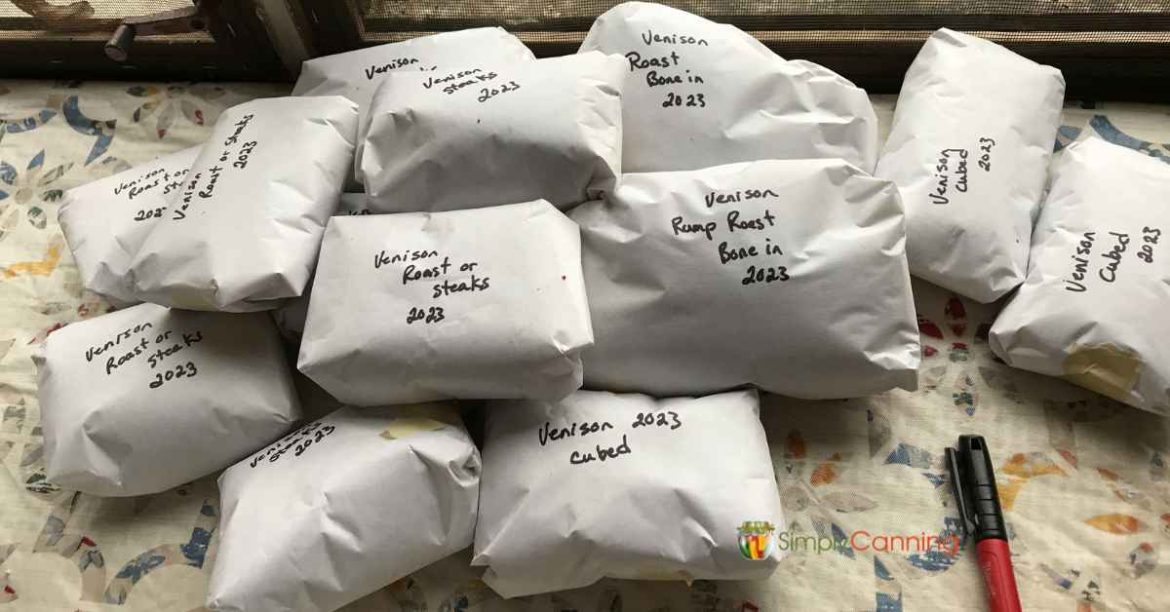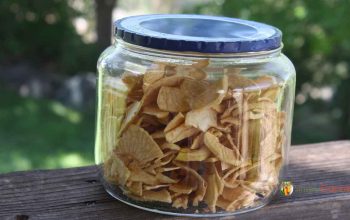If you’re raising your own animals, hunting wild game, stocking up at the grocery store, or buying bulk meat from a local farmer, freezing meat is one of the most common ways to preserve it for longer periods of time. With proper packaging, your meat will last for many months in the freezer.
In this article, I’ll show you how I package meat in plastic wrap and freezer paper for maximum freezer storage potential. Let’s fill your freezer with fresh meat!
This is method I use for wild game. The same process can be used for home butchered, or store-bought meat that may already come in packages too.
How Much Meat Do I Need to Freeze?
These instructions will work for various amounts of meat. It is generally recommended that you package meat in amounts that you’ll want to use in one sitting, such as a single meal. How much you package will really depend on how many people you’re feeding and how you usually use your meat! For example…
- One dinner sized roast would be a single package.
- If you generally cook 3 steaks for one dinner, then freeze 3 steaks in each package.
- Package stew meat up in quantities for one batch of stew.
- Package up ground meat in 1 pound or 2 pound packages depending on how much you usually use.
- Package up chicken pieces in what you’d eat in a meal. For us that means one breast (for me) and a thigh and drumstick (for my husband). This all goes in one package.
You can freeze any sort of fresh meat, including beef, pork, chicken, turkey, rabbit, venison, etc. The only type of meat that requires special treatment is cured meats, which shouldn’t be stored in the freezer for more than a few months because its salt content speeds up aging. (Fish requires a different process as well, which I don’t go into here.)
Extended Directions & Tips for Freezing Meat
Before you freeze meat, it should be chilled in the refrigerator at 32 to 36 degrees F before packaging. It is best if the meat is already cool when it goes in the freezer.
If packaging large game, you may need to trim up the meat a bit before packaging for the freezer too.
Cut meat into smaller pieces or grind as desired.
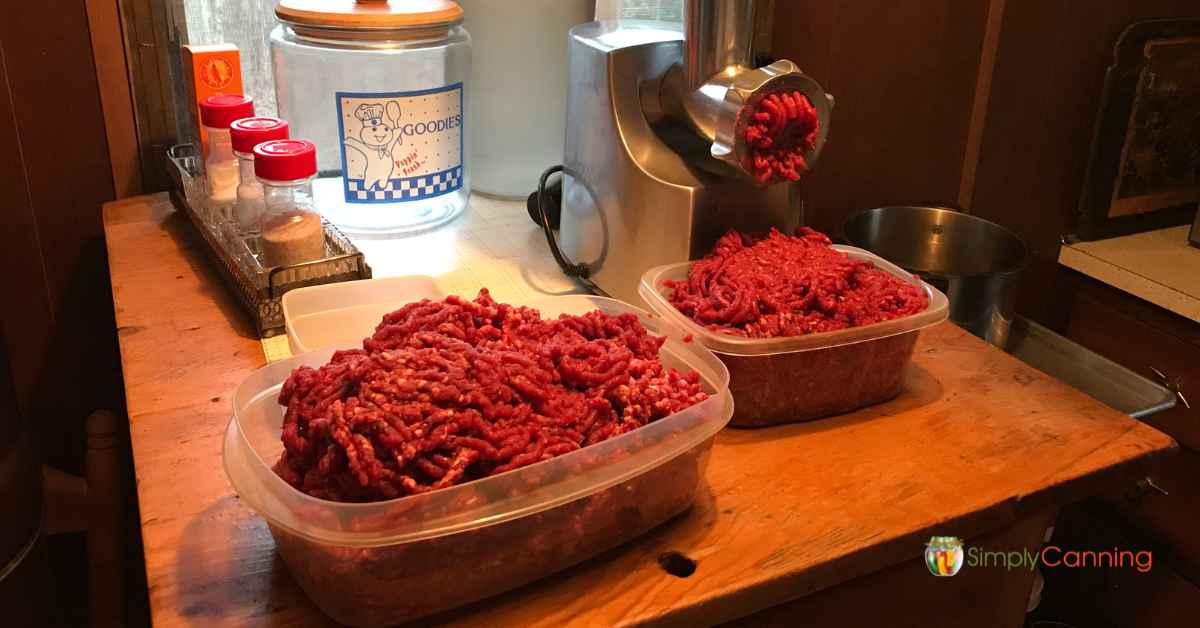
When making ground meat, I will run it through our meat grinder and then weigh it into a pound or two packages using a kitchen scale.
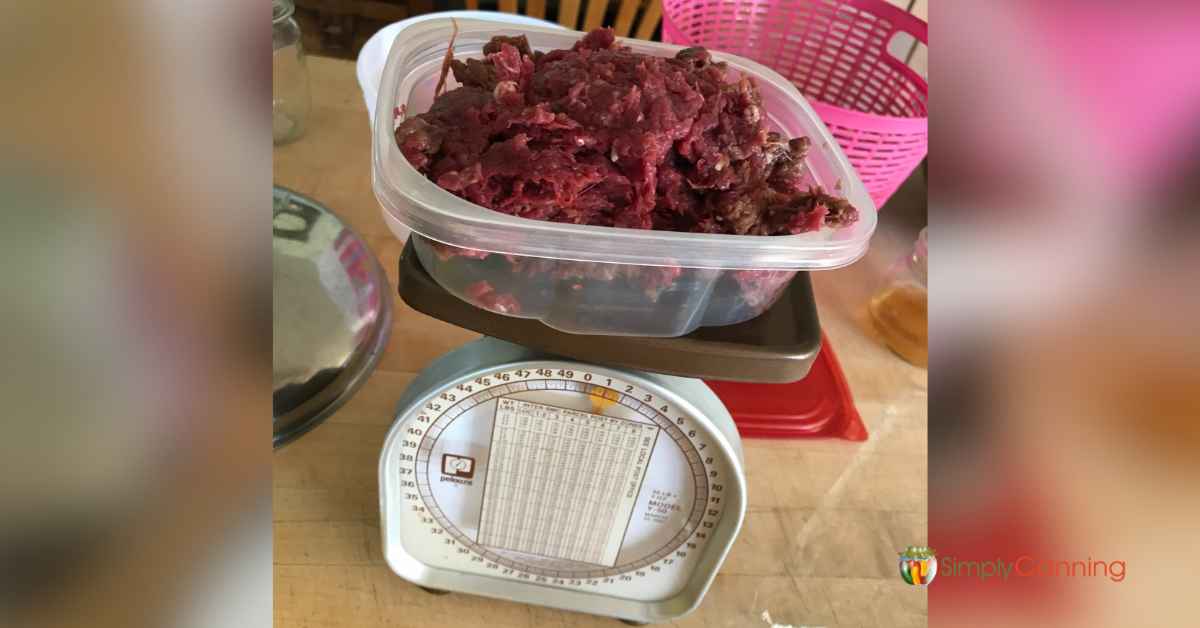
For ground beef it is nice to have a small container as a sort of “mold”. When you dump this out on a piece of plastic wrap (next step) it will keep it’s squarish shape and be easy to wrap up.
We also cut steaks and roasts into desired sizes, trimming off anything that should be removed. (This is more of an issue with freshly slaughtered or harvested meat, not so much meat from the store.)
Wrapping Meat for Freezing
Wrap prepared meat in plastic wrap.
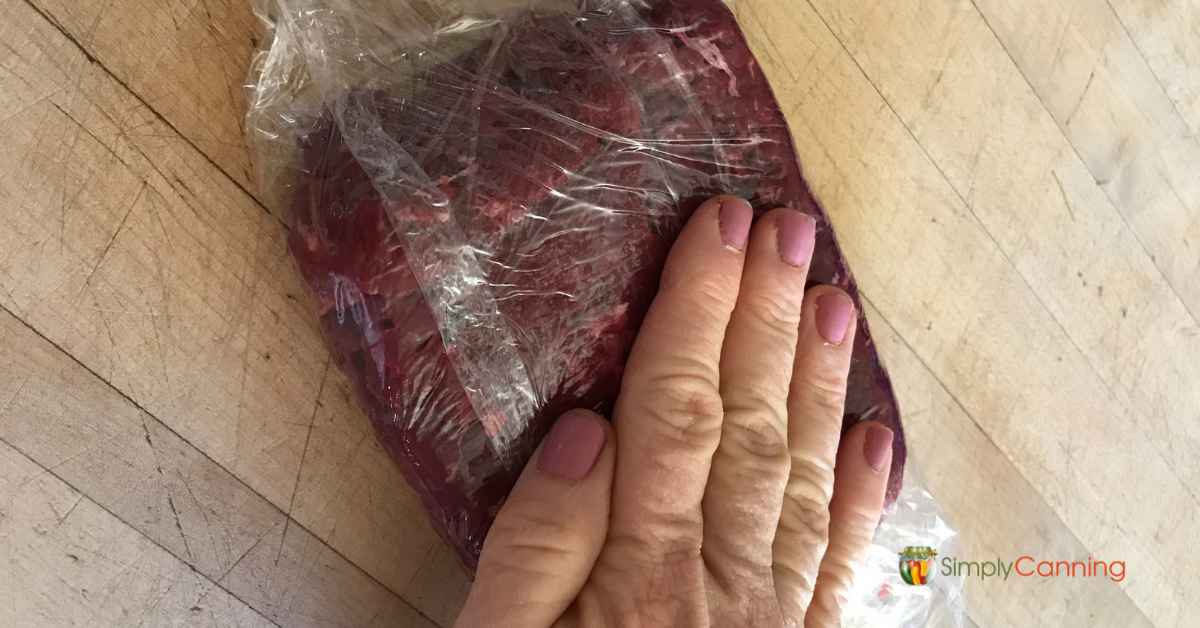
Wrap prepared meat tightly in plastic wrap. I wrap a layer or two and keep it tight. For ground meat, I also gently press it into my desired shape, so it will stack better in the freezer as blocks.
How to wrap meat in freezer paper.
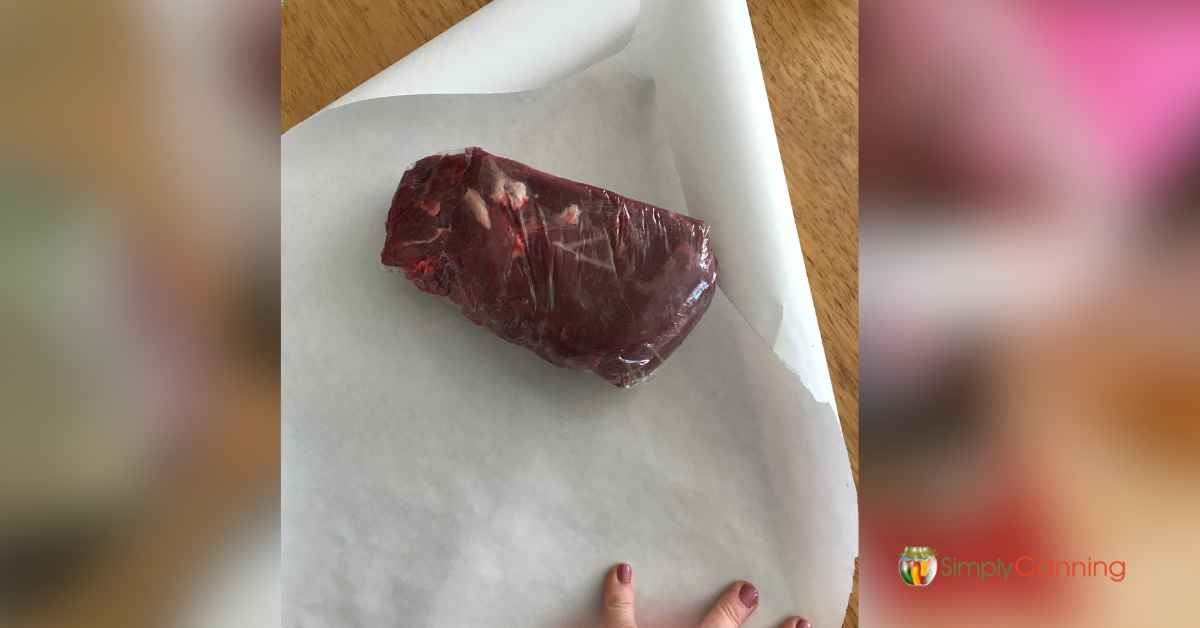
Once meat is wrapped in plastic wrap, I wrap it again in freezer paper. You want the slick side of the paper facing inward toward to the meat to protect it. You can also put your wrapped meat into freezer bags.
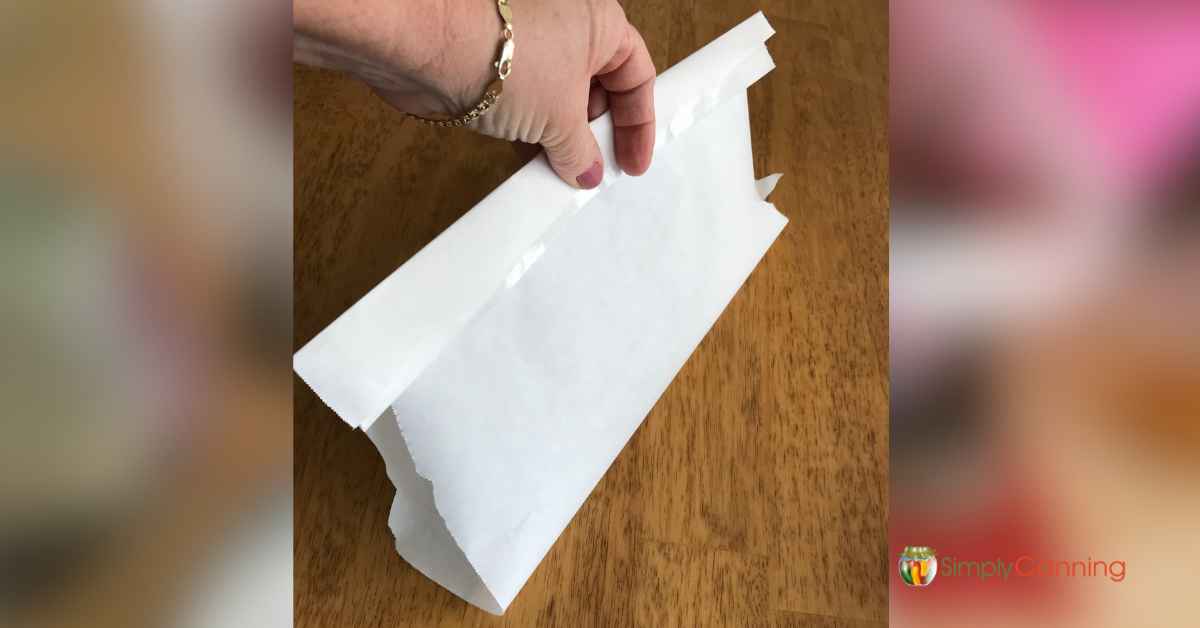
![Folding the freezer paper over a piece of meat.]](https://www.simplycanning.com/wp-content/uploads/Freezing-Meat-12.jpg)
Pull the sides of the paper up and fold the edges over repeatedly. Then fold up the sides just like a birthday present.? This will close the package tightly and keep out as much air as possible.
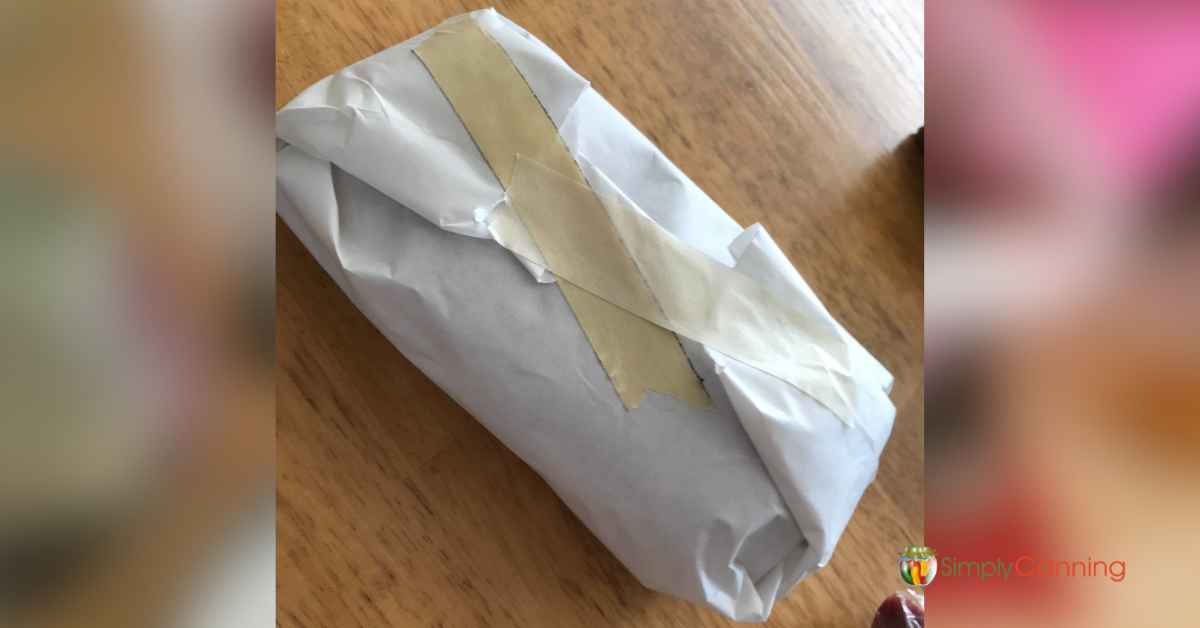
Use masking tape to tightly close the butcher paper. (So I hope your actual birthday presents look a little neater than this, but you get the idea right?)

Quick tip: Tear off pieces of masking tape and hang them off the edge of your table or countertop, so you can quickly pull one off and use a piece of tape without trying to rip a piece off the roll as you’re juggling a package of meat.
Use freezer bags instead of freezer paper.
If you don’t want to use freezer paper you can also just use freezer bags. You could technically just put the meat in the freezer bag without the extra step of plastic wrap. But that double layer of protection is nice.
Freezer bags also allow you to place several pieces in one bag but still have them separate so you can just take out one at a time. Two roasts for example may fit into a gallon size freezer bag. Or 2 packages of ground can be put in one freezer bag. Just pull one out when you need it.
Labeling
Label each package with its contents and date. I use a permanent or felt tip marker for this.

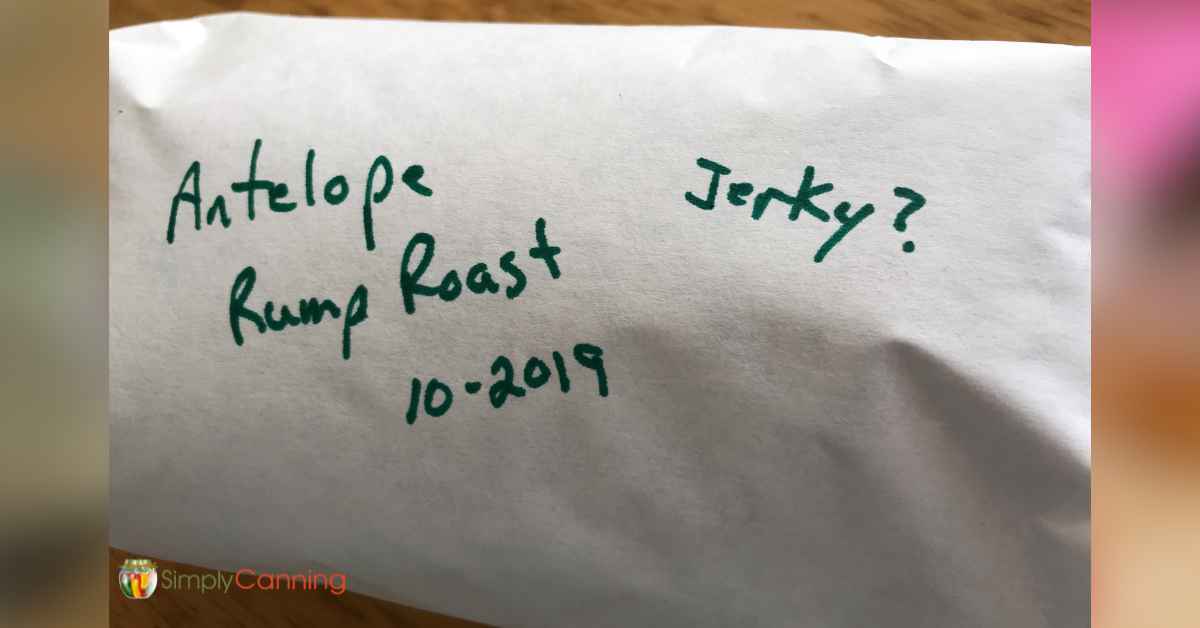
Freeze packaged meat immediately after wrapping. Try to put them in the freezer without stacking more than 2 high. Single layer is even better. The reason for this is the time to frozen. If meat is stacked high, the packages in the middle will take longer to freeze.
After they are frozen you can stack them in a more efficient manner if needed.
How long can you keep meat in the freezer?
Exact length of time varies depending on the cut of meat.
Official sources will say that ground meat should be stored for 3 to 4 months, while steaks, chops, and roasts can be stored for 4 to 12 months. Poultry can be stored in the freezer for 9 months (as pieces) or 1 year (whole birds).
Personally, I’ve had meat in the freezer for a year with no issues. It is a quality thing. The longer the time the more likely things like freezer burn might be an issue.
What is freezer burn?
Freezer burn can happen with meat over time. It can look like ice crystals on the meat, or your meat might just look dried out and discolored around the edges. It happens if the meat is exposed to the air in the freezer. This would likely be if it is not wrapped securely. Thus my reason for liking that double layer of plastic wrap then freezer paper or bags.
Freezing meat in butcher paper?
Is butcher paper and freezer paper the same thing? No actually it is not. The freezer paper I refer to in this article has a coated side. This coated side protects from moisture and air. Butcher paper is just a heavy weight paper for wrapping meat. If you are going to freeze it, use freezer paper.
Is there any downside to freezing meat?
The main downside is that to keep meat frozen, you need a consistent connection to electricity or a generator. If the power goes out for several days, you may need to find an alternative before your meat spoils.
Before You Go…
Short on freezer space? You might be surprised to learn that canning meat is relatively fast and easy. You just need a pressure canner to do it! Learn about canning meat of all kinds on this page.
Recipe Card
Sources:
- https: //nchfp.uga.edu/how/freeze/meat-and-poultry-products/freezing-meats/#gsc.tab=0
- https: //extension.missouri.edu/publications/gh1504
- https: //extension.psu.edu/freezing-and-refreezing-meat
- https: //www.foodsafety.gov/food-safety-charts/cold-food-storage-charts
